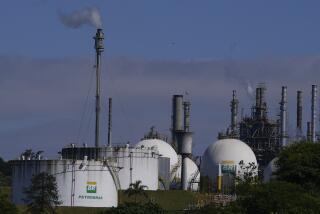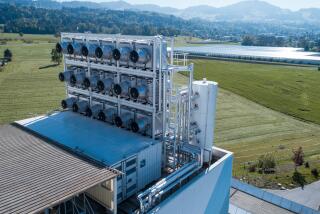Oil, Auto Firms to Unveil Alternative Fuels Project
- Share via
The Big Three auto makers and several major oil companies are expected to announce Tuesday in Washington an unprecedented multimillion-dollar joint research project to test low-emission gasolines and other fuels to meet proposed federal clean air standards.
The auto makers and about 14 oil companies would share equally the cost of the project, estimated at about $14 million in its first phase, said Richard J. Stegemeier, chairman, president and chief executive of Unocal Corp. Other sources estimated the cost at $11 million to $12 million.
The project, which has been under discussion since President Bush first proposed a sweeping new clean air bill earlier this summer, is intended in part to bolster industry arguments that reformulated gasolines can meet new standards as well as methanol, ethanol, compressed natural gas or other alternative fuels that could be mandated under the bill.
The project would be the most ambitious example of cooperation between the two industries. They have worked together before on smaller issues, but each has pointed to the other when it came to meeting clean air goals.
“It’s a milestone in cooperation that has not taken place in the past,” Stegemeier said in an interview Thursday. “There’s been an adversarial situation here for years. . . . (But) we can’t do it by pinpointing bits and pieces of the whole clean air chemistry,” he said. “We have to look at systems, and that’s what we’re finally doing.”
Stegemeier added that outside scientists, including one from Caltech, would review test results and that officials of the Environmental Protection Agency would be asked to monitor the tests.
Participants would include Ford Motor Co., General Motors Corp. and Chrysler Corp., as well as Amoco Corp., Unocal, Atlantic Richfield Co. and “essentially . . . all major integrated oil companies in the United States,” Stegemeier said.
A spokesman for the American Petroleum Institute, the oil industry’s main trade group, said oil and auto executives would make a joint announcement Tuesday in Washington, but declined to comment further.
The project would test fuels in two phases, Stegemeier said. In the first phase, which is beginning now and should be completed within a year, the auto companies would provide a fleet of old and current cars with different configurations of engines and catalytic converters.
Oil companies would provide various new formulations of gasolines, as well as M85, a mix of 85% methanol and 15% gasoline. Stegemeier said he thought Phillips Petroleum Co. would provide the bulk of the test fuel; a spokesman for Phillips declined to comment.
Testing would occur in auto maker laboratories, Stegemeier said.
An auto industry source said data on emissions would be tabulated, then entered into various computer models of so-called air sheds, or atmospheric environments, representing different metropolitan areas. The result would be a picture of the smog that would result from different mixes of fuels and autos in a given area, the source said.
The data would then be provided for use in the rule-making process following the passage of clean air legislation.
The second phase of the project would test alternative fuels in automobiles with designs intended for use in the future. Stegemeier did not have an estimate of how much that phase would cost or when it would begin.
Richard D. Wilson, director of the EPA’s office of mobile sources in Washington, said his agency had not yet been consulted on the project.
As for whether it’s possible for reformulated gasolines to meet clean air standards, he added: “It hasn’t been shown at all that it is. We have a lot of test data on the other fuels, so we know they are possible.” If tests show that gasoline can achieve the same results, he added, “that’s great.”
The project was spawned by a provision in the President’s clean air bill that would mandate millions of autos to operate on alternative fuels rather than gasoline by the late 1990s. On Wednesday, a House subcommittee voted against the provision, though proponents vowed to restore it in later sessions.
The two industries have denied suggestions that the project is intended to kill methanol or other alternative fuels, though both industries have sizable investments in gasoline-based infrastructure and technology.
Officials of the auto companies declined to comment on the project.
BACKGROUND President Bush’s proposed clean air legislation spurred oil companies and auto companies to discuss setting up a joint project to test low-emissions gasolines as an alternative to methanol, ethanol, compressed natural gas or other more costly alternative fuels. The companies want to push gasoline as the clean air fuel of choice.






